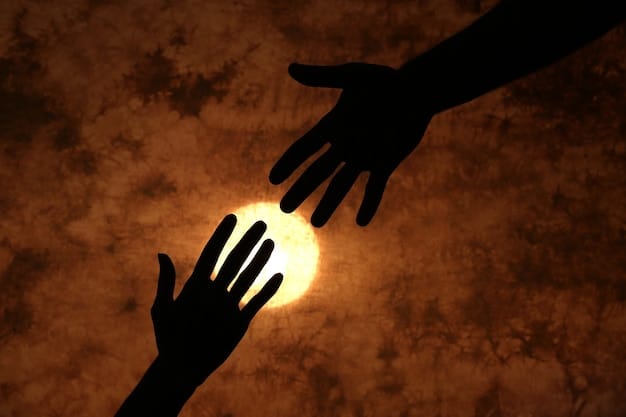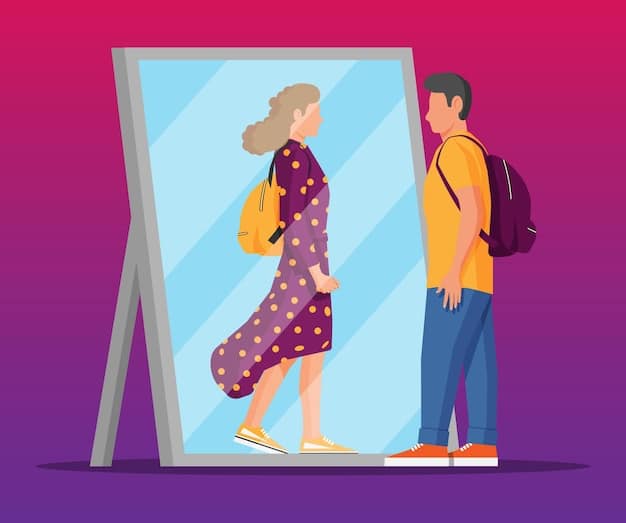Forgiveness: Letting Go of Resentment and Healing Your Life

The art of forgiveness is a transformative process that involves intentionally releasing feelings of resentment, anger, or vengeance toward someone who has wronged you, ultimately promoting emotional healing and personal growth.
Discover **the art of forgiveness** and learn how to let go of resentment, heal emotional wounds, and cultivate a more peaceful, fulfilling life. It’s a journey worth taking.
Understanding Forgiveness: A Path to Emotional Freedom
Forgiveness is often misunderstood as condoning harmful behavior, but it’s actually about releasing yourself from the emotional burden of resentment. It’s a process that can lead to profound emotional freedom.
Understanding the true meaning of forgiveness is the first step in embracing its transformative power. It’s not about forgetting, excusing, or reconciling; it’s about choosing to liberate yourself from the grip of anger and pain.
What Forgiveness Is Not
It’s crucial to distinguish forgiveness from other concepts to truly grasp its essence. Forgiveness is not about justifying the actions of others, nor is it about pretending the hurt never happened.
- It’s not forgetting the offense.
- It’s not excusing the behavior.
- It’s not necessarily reconciling with the offender.
- It’s not denying your own pain.
Instead, forgiveness is an active choice to release yourself from the negative emotions associated with the offense. It’s an inward journey toward peace and healing.
Ultimately, understanding what forgiveness is *not* helps clarify its true purpose: personal liberation and emotional well-being.
The Benefits of Practicing Forgiveness
Forgiveness offers a multitude of benefits that ripple through your mental, emotional, and even physical well-being. Choosing to forgive isn’t always easy, but the rewards are immense.
When you embrace forgiveness, you unlock a path toward greater happiness, improved relationships, and enhanced overall health. It’s an investment in your own well-being that yields profound returns.

Here are some key benefits of incorporating forgiveness into your life:
Improved Mental Health
Forgiveness frees you from the cycle of rumination and negative thoughts, leading to reduced stress, anxiety, and depression.
Strengthened Relationships
Forgiveness allows you to repair and deepen connections with others, fostering empathy and understanding.
By breaking free from the chains of resentment, you create space for compassion, empathy, and healthier connections with those around you. It paves the way for more fulfilling and meaningful relationships based on mutual respect and understanding.
Choosing to forgive is an act of self-compassion that ultimately enriches your life and the lives of those you touch.
Steps to Forgiving Someone
Forgiveness is a process, not an event. It requires time, patience, and a willingness to confront your own emotions. There’s no one-size-fits-all approach, but here are some helpful steps to guide you on your journey.
Embarking on the path of forgiveness involves understanding your emotions, making a conscious decision to forgive, and practicing empathy. It’s a journey of self-discovery and healing.
Acknowledge Your Pain
Allow yourself to feel the full range of emotions associated with the hurt, without judgment or suppression. Recognizing and validating your pain is a crucial first step.
Make a Conscious Decision
Choose to forgive, understanding that it’s for your own benefit, not necessarily for the benefit of the person who harmed you. This decision marks a turning point in your healing process.
Practice Empathy
Try to understand the other person’s perspective and circumstances, even if you don’t agree with their actions. This doesn’t excuse their behavior, but it can help you develop compassion.
Remember, the process of forgiving someone is a personal journey, and it’s okay to take your time and seek support along the way.
Forgiving Yourself: A Vital Component
Forgiveness isn’t just about extending grace to others; it’s also about offering compassion and understanding to yourself. Self-forgiveness is an essential part of healing.
Often, we hold ourselves to impossibly high standards, leading to self-criticism and regret. Learning to forgive yourself is crucial for cultivating self-acceptance and inner peace.
Acknowledge Your Mistakes
Instead of dwelling on your shortcomings, take responsibility for your actions and learn from your experiences.
Practice Self-Compassion
Treat yourself with the same kindness and understanding you would offer a friend. Recognize that everyone makes mistakes, and you are worthy of forgiveness.

- Accept that you’re human and imperfect.
- Focus on growth and learning, not on self-blame.
- Practice mindfulness and self-care.
Self-forgiveness is not about excusing your actions but about accepting your humanity and moving forward with greater self-awareness and compassion.
Ultimately, forgiving yourself allows you to break free from the shackles of guilt and embrace a more positive and fulfilling life.
The Role of Time in Forgiveness
Forgiveness is a process that unfolds over time, and there’s no set timeline for healing. It’s important to be patient with yourself and allow the process to unfold naturally.
Pressuring yourself to forgive before you’re ready can be counterproductive. Recognize that healing takes time and that setbacks are a normal part of the journey.
Allow Yourself to Grieve
Grief is a natural response to loss and hurt. Allow yourself to feel the emotions associated with the experience without judgment or pressure.
Seek Support
Talking to a trusted friend, family member, or therapist can provide valuable support and guidance during the forgiveness process.
Remember that forgiveness is not a linear path. There will be ups and downs, moments of clarity and moments of doubt. Be kind to yourself and trust that you are moving in the right direction.
Ultimately, honoring the role of time in forgiveness allows you to heal at your own pace and cultivate a deeper sense of self-compassion and acceptance.
Maintaining Forgiveness in the Long Term
Forgiveness isn’t a one-time event; it’s an ongoing practice that requires conscious effort and commitment. Maintaining forgiveness in the long term involves cultivating empathy, setting healthy boundaries, and practicing self-care.
As you move forward, you can actively nurture forgiveness by focusing on the lessons learned, practicing gratitude, and letting go of residual resentment.
Cultivate Empathy
Continue to try to understand the other person’s perspective, even when it’s challenging. Empathy fosters compassion and strengthens your ability to forgive.
Set Healthy Boundaries
Protect yourself from further harm by setting clear boundaries and communicating your needs assertively. This helps prevent future resentment.
By actively nurturing forgiveness, you can create a more peaceful and fulfilling life, free from the burden of resentment and bitterness.
Ultimately, maintaining forgiveness in the long term is an act of self-care that promotes emotional resilience and lasting well-being.
| Key Point | Brief Description |
|---|---|
| 🙏 Understanding Forgiveness | It’s about releasing yourself from resentment, not condoning harmful behavior. |
| ❤️ Benefits of Forgiveness | Improved mental health, strengthened relationships, and overall well-being. |
| 🌱 Forgiving Yourself | Acknowledge mistakes, practice self-compassion, and focus on personal growth. |
| ⏳ The Role of Time | Healing takes time; be patient and seek support when needed. |
Frequently Asked Questions
▼
No, forgiveness is not about forgetting the incident. It’s about releasing the negative emotions associated with it and choosing not to let it control your life.
▼
Not necessarily. Reconciliation depends on the situation and the willingness of both parties. Forgiveness is primarily for your own healing, regardless of reconciliation.
▼
Forgiveness is a choice, not a feeling. You can start by acknowledging your pain and making a conscious decision to work towards forgiveness, even if you don’t feel it initially.
▼
The timeline for forgiveness varies for each person and situation. It can take days, months, or even years. Be patient with yourself and allow the process to unfold naturally.
▼
Yes, forgiveness is about your own healing and liberation, not about the other person’s remorse. You can forgive them for your sake, regardless of their apology.
Conclusion
Embracing **the art of forgiveness** is a powerful journey toward emotional freedom and inner peace. By understanding its true meaning, recognizing its benefits, and practicing forgiveness toward yourself and others, you can cultivate a more compassionate and fulfilling life. Remember that forgiveness is a process, not an event, and that it requires time, patience, and a willingness to heal.





